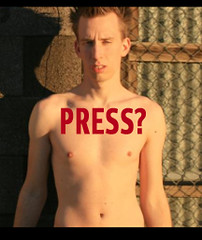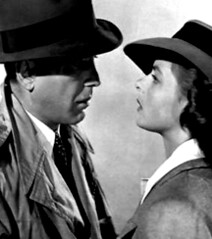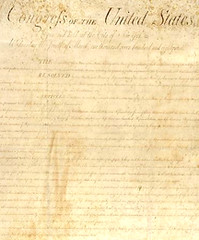 "You furnish the pictures and I'll furnish the war." — William Randolph Hearst
"You furnish the pictures and I'll furnish the war." — William Randolph HearstWith the financial support of his mother, William Randolph Hearst bought the failing New York Journal in 1885. And, within a few short years, his name, along with that of Joseph Pulitzer, who purchased his way into the publishing business (he originally bought the Post for $3,000 and other papers before the New York World), became forever associated with yellow journalism.
Hearst, in particular, was ridiculed and criticized by Upton Sinclair for having newspaper employees who were "willing by deliberate and shameful lies, made out of whole cloth, to stir nations to enmity and drive them to murderous war."The assertion is linked to the idea that if it had not been for the publishings of Hearst and Pulitzer, there may have never been popular support for U.S. military adventurism in Cuba, Puerto Rico and the Philippines in 1898. But neither Hearst nor Pulitzer were alone in their endeavors to shape the news.
Earlier in American history, it was Alexander Hamilton (1801) who pooled together $10,000 from investors to start the New York Evening Post, specifically to take aim at Thomas Jefferson and the rise in popularity of the Democratic-Republican Party. And, before that, it was newspapers that helped spur on the American Revolution by taking creative license when publishing images such as the famed Boston Massacre. The image, of course, did not represent the facts. The British soldiers were later acquitted for acting in self-defense.
The formalization of objective journalism is a relatively new idea.These are just some of the historic footnotes I consider every time I hear the term “citizen journalists,” which is generally defined as citizens playing an active role in the process of collecting, reporting, analyzing and disseminating news and information. Most notably, the moniker seems to be assigned to bloggers to suggest that they are somehow they are less than journalists (assuming they even want to be journalists).
Yet, with relative ease it seems, all of those mentioned above — Pulitzer and Hearst and Hamilton and Jefferson — and many others not named — Sam Adams and Benjamin Franklin among them — certainly fit the definition as very actively engaged citizens, without rules, who pursued printing the news as they felt fit.
In fact, Reese Cleghorn, former president of AJR and former dean of the College of Journalism of the University of Maryland, helped put some of this in perspective in 1995. In his
article, he leads with how Walter Lippmann commented on "the new objective journalism" and what it might mean for journalism schools in 1931. An excerpt:
"I do not know much about the schools of journalism," Lippman said, "and I cannot say, therefore, whether they are vocational courses designed to teach the unteachable art of the old romantic journalism or professional schools aiming somehow to prepare men for the new objective journalism.
"I suspect, therefore, that schools of journalism in the professional sense will not exist generally until journalism has been practiced for some time as a profession. It has never yet been a profession. It has been at times a dignified calling, at others a romantic adventure, and then again a servile trade.
"But a profession it could not begin to be until modern objective journalism was successfully created, and with it the need of men who consider themselves devoted, as all the professions ideally are, to the service of truth alone."Think of it for a moment. According to Cleghorn, professional, objective journalism was a mere 64 years old when he wrote his article. And, even then, he was not sure journalism was a profession.
Journalism has always been the art of participating citizens to report.So it is often with this understanding, I am
amused by debates between Michael Tomansky, Guardian America, who
suggests that “Journalists relinquish rights frequently in the course of doing their work responsibly, as you well know.” and Jeff Jarvis, BuzzMachine, who
counters that “We journalists have long traded in the currencies of access and exclusivity with the powerful. But the price we pay is complicity in a system of secrecy.”
Gentleman, please pause a moment to consider that you are debating a concept that has yet to survive a complete century against another that is less than five years old. So-called professional journalists, those who evolved out of objective journalism, were never meant to be bound by rules, except one, also penned by Lippman.
“There is no higher law in journalism than to tell the truth and shame the devil.”As one of my journalism professors, Jake Highton, reiterated again in 1978: “Although it has codes of ethics and credos, journalism really has no laws. Yet what Lippman said in the 1920s remains true today: Telling the truth is the highest law of journalism.”
So as unfortunate as it sounds, Jarvis stands correct on those grounds. For a journalist to adhere to a promise of omission for the privilege of inclusion ... well, that strikes me as a promise to not tell the truth.
The division of citizen from journalist ought to be struck from our tongues.Throughout history, journalists were simply citizens who hoped to make change, with the concept of reporting the truth a secondary consideration in the early 1900s. The only criteria for admission into the field was the cost of a printing press or the ability to knit prose with enough efficiency to be paid by someone who could afford it.
Certainly, social media has lowered the entrance fee considerably, but I propose it has not lowered the bar by any other measure. You see, there have always been journalists who have adhered to and/or relinquished their sense of ethics. But never has there been a code that has withstood the test of time or shackled the profession beyond individual reputation.
Let's face it. Even today, the largest publishers in the world remain tabloids that are willing to publish unsubstantiated fact and fiction at their leisure, sometimes with startling accuracy and other times without a sliver of truth. Should we impose more rules on bloggers than we would the largest publishers in the world? I think not.
And to that end I guess, as important as the conversation might be, what right would any group have to propose such unspoken governance over anyone? Truly, if there are any laws that bloggers might consider, I believe those laws might already be on the
books with no other rules necessary.
As professionals continue to discuss the merits of somehow
distinguishing the citizen journalist from the professional journalist, I suggest we not tread so heavily to put self-imposed etiquette over free expression. As wiser folks remind us…
“Better a thousandfold abuse of free speech than denial of free speech. The abuse dies in a day, but the denial slays the life of the people, and entombs the hope of the race." — Charles Bradlaugh

























